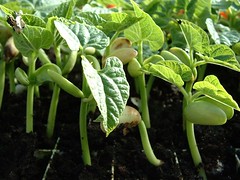 Image by Nick Saltmarsh via FlickrThe simple answer is that organic gardeners don't use synthetic fertilizers or pesticides on their plants. But gardening organically is much more than what you don't do.
Image by Nick Saltmarsh via FlickrThe simple answer is that organic gardeners don't use synthetic fertilizers or pesticides on their plants. But gardening organically is much more than what you don't do. When you garden organically, you think of your plants as part of a whole system within nature that starts in the soil and includes the water supply, people, wildlife and even insects. An organic gardener strives to work in harmony with natural systems and to minimize and continually replenish any resources the garden consumes.
Organic gardening operates on the sustainable concept of recycling. You use animal waste, kitchen scraps, and vegetable waste to mulch and compost. You will use common household items like vinegar and soap to prevent pests and weeds.
Organic growers rely on developing a healthy, fertile soil and growing a mixture of crops. Genetically modified (GM) crops and ingredients are not allowed under organic standards. Many organic gardeners also prefer to grow from heirloom seeds, rather than modern hybrids, although this is not a prerequisite.
Organic gardening is the merging together of plants and soil allowing the Earth to naturally bear what it was made to do. The plants and the soil are one working together to provide food and nourishment not only to humans but to animals and organisms as well.
It’s not a new age science. It’s actually quite simple and can be satisfying to the soul, and the body!

No comments:
Post a Comment